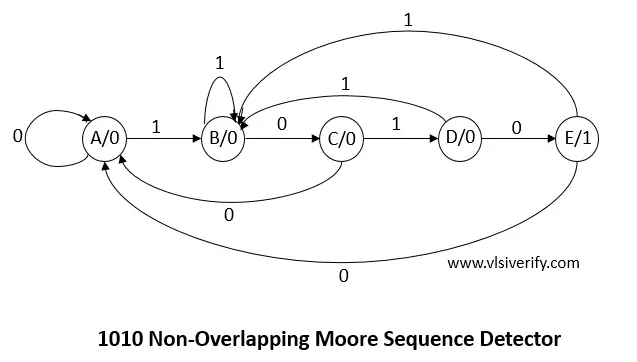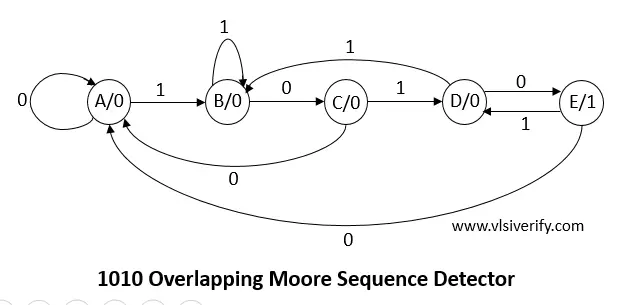Moore Sequence Detector
In moore machine, output only depends on the present state. It is independent of current input. It is important to understand basics of finite state machine (FSM) and sequence detector.
1010 non-Overlapping Moore Sequence Detector Verilog Code

module seq_detector_1010(input bit clk, rst_n, x, output reg z);
parameter A = 4'h1;
parameter B = 4'h2;
parameter C = 4'h3;
parameter D = 4'h4;
parameter E = 4'h5; // extra state when compared with Mealy Machine
bit [3:0] state, next_state;
always @(posedge clk or negedge rst_n) begin
if(!rst_n) begin
state <= A;
end
else state <= next_state;
end
always @(state or x) begin
case(state)
A: begin
if(x == 0) next_state = A;
else next_state = B;
end
B: begin
if(x == 0) next_state = C;
else next_state = B;
end
C: begin
if(x == 0) next_state = A;
else next_state = D;
end
D: begin
if(x == 0) next_state = E;
else next_state = B;
end
E: begin
if(x == 0) next_state = A;
else next_state = B; //This state only differs when compared with Moore Overlaping Machine
end
default: next_state = A;
endcase
end
//As output z is only depends on present state
always@(state) begin
case(state)
A : z = 0;
B : z = 0;
C : z = 0;
D : z = 0;
E : z = 1;
default : z = 0;
endcase
end
endmoduleTestbench Code
module TB;
reg clk, rst_n, x;
wire z;
seq_detector_1010 sd(clk, rst_n, x, z);
initial clk = 0;
always #2 clk = ~clk;
initial begin
x = 0;
#1 rst_n = 0;
#2 rst_n = 1;
#3 x = 1;
#4 x = 1;
#4 x = 0;
#4 x = 1;
#4 x = 0;
#4 x = 1;
#4 x = 0;
#4 x = 1;
#4 x = 1;
#4 x = 1;
#4 x = 0;
#4 x = 1;
#4 x = 0;
#4 x = 1;
#4 x = 0;
#10;
$finish;
end
initial begin
// Dump waves
$dumpfile("dump.vcd");
$dumpvars(0);
end
endmoduleOutput:
1010 Overlapping Moore Sequence Detector Verilog Code


module seq_detector_1010(input bit clk, rst_n, x, output reg z);
parameter A = 4'h1;
parameter B = 4'h2;
parameter C = 4'h3;
parameter D = 4'h4;
parameter E = 4'h5; // extra state when compared with Mealy Machine
bit [3:0] state, next_state;
always @(posedge clk or negedge rst_n) begin
if(!rst_n) begin
state <= A;
end
else state <= next_state;
end
always @(state or x) begin
case(state)
A: begin
if(x == 0) next_state = A;
else next_state = B;
end
B: begin
if(x == 0) next_state = C;
else next_state = B;
end
C: begin
if(x == 0) next_state = A;
else next_state = D;
end
D: begin
if(x == 0) next_state = E;
else next_state = B;
end
E: begin
if(x == 0) next_state = A;
else next_state = D;
end
default: next_state = A;
endcase
end
//As output z is only depends on present state
always@(state) begin
case(state)
A : z = 0;
B : z = 0;
C : z = 0;
D : z = 0;
E : z = 1;
default : z = 0;
endcase
end
endmoduleTestbench Code
module TB;
reg clk, rst_n, x;
wire z;
seq_detector_1010 sd(clk, rst_n, x, z);
initial clk = 0;
always #2 clk = ~clk;
initial begin
x = 0;
#1 rst_n = 0;
#2 rst_n = 1;
#3 x = 1;
#4 x = 1;
#4 x = 0;
#4 x = 1;
#4 x = 0;
#4 x = 1;
#4 x = 0;
#4 x = 1;
#4 x = 1;
#4 x = 1;
#4 x = 0;
#4 x = 1;
#4 x = 0;
#4 x = 1;
#4 x = 0;
#10;
$finish;
end
initial begin
// Dump waves
$dumpfile("dump.vcd");
$dumpvars(0);
end
endmoduleOutput:

Verilog Codes